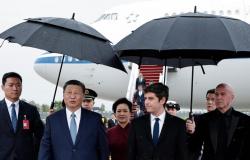– Amnesty International’s report paints a grim picture of alarming violations of human rights and international law, at a time when global inequalities are increasing, superpowers are fighting for supremacy and the climate crisis is escalating, says the organisation’s Secretary General Agnès Callamard.
– Israel’s obvious lack of respect for international law is reinforced by the fact that the country’s allies do not stop the indescribable carnage to which the civilian population in Gaza is subjected. Many of the same allies were architects behind the international legal order that was established after the Second World War, she continues.
– Simultaneously with Russia’s ongoing aggression against Ukraine, the number of armed conflicts and the massive violations of human rights in countries such as Sudan, Ethiopia and Myanmar are increasing. The international rules-based legal order risks disintegration, says Callamard.
French human rights activist and Secretary General of Amnesty International Agnes Callamard shows Amnesty International’s The State of the World’s Human Rights report during a press conference 04/24/24
Photo: AFP
Israel
With its relentless attacks on civilians in the Gaza Strip, Israel’s government makes a mockery of international law, Amnesty states in its over 400-page annual report.
The human rights organization strongly condemns the attack by Hamas and other armed groups that triggered the war, but states that nothing can justify what the civilian population of Gaza has since been subjected to.
Amnesty has investigated nine individual Israeli attacks, including the attack that killed 19 members of the same family in Deir al-Balah on 22 October, in an area the Israeli army had previously promised was “safe”.
The human rights organization also refers to Israel’s systematic destruction of hospitals and the water and electricity networks in Gaza, as well as the killing of health personnel, aid workers and journalists.
The conclusion is that many of the attacks are arbitrary and a violation of international law, and the evidence that war crimes are being committed is increasing, Amnesty concludes.
Allies
The US is also harshly criticized by Amnesty for having paralyzed the UN Security Council for several months and obstructing resolutions demanding a cease-fire in Gaza, while continuing to supply Israel with arms and ammunition.
Amnesty also accuses European countries such as Germany and Great Britain of grotesque double standards and points out that they have rightly condemned war crimes committed by Hamas and Russia, but have failed to condemn Israel’s mass destruction and murder of over 30,000 Palestinians in Gaza.
– The failure of the international community when it comes to preventing thousands of civilians in the occupied Gaza Strip from being killed, an appallingly high proportion of them children, shows how the international institutions that were established to protect civilians and human rights are no longer fit for purpose, states Callamard.
Apartheid
According to Amnesty, last year the Israeli authorities tightened the apartheid regime that oppresses the Palestinians in the occupied West Bank, where 493 Palestinians were killed by Israeli soldiers and settlers last year, the deadliest year since 2005. According to the UN, most of the victims were civilians, 110 of them children.
The Palestinian authorities are also criticized, for example for cracking down on access to the opposition, for arbitrarily imprisoning dissidents and for torturing and ill-treatment of prisoners.
Militant Palestinian groups are accused of indiscriminate attacks against civilian Israelis, as well as extrajudicial executions of suspected spies and defectors in both the West Bank and the Gaza Strip.
Russian war crimes
Amnesty also documents how Russia commits extensive war crimes in Ukraine, including indiscriminate attacks on densely populated areas and systematic bombing of grain stores and civilian infrastructure.
Russia is also accused of torturing and ill-treating Ukrainian prisoners of war, as well as of deliberately causing major environmental damage through its war of aggression in Ukraine.
Both Russia and Ukraine use cluster munitions and land mines in the war, which will make large areas dangerous for generations even after peace has settled.
At the same time, the human rights situation in Russia is getting increasingly worse, notes Amnesty, which refers to, among other things, the authorities’ restrictions on freedom of expression and assembly, persecution and imprisonment of opposition figures and extensive torture and ill-treatment of inmates.
Several opposition figures died last year under unclear circumstances in captivity, including Alexei Navalny.
The Russian authorities also do not crack down on the use of violence against migrants, call the LGBT movement extremist and have introduced strict control over the media.
Sudan and Myanmar
Amnesty covers a total of 155 countries in its annual report, and many come out badly in several areas.
Both the government forces and the RSF militia, which plunged Sudan into a brutal civil war in April 2023, are accused of indiscriminate attacks on densely populated areas.
At least 12,000 were killed last year and the war has triggered the world’s biggest refugee disaster, but the world’s attention is directed instead to Ukraine and Gaza.
The war between the military junta and armed rebel groups is also escalating in Myanmar. The regime crushes all access to opposition, over 4,000 civilians have been killed since the coup in 2021, and democracy advocates are thrown in prison.
A released prisoner is welcomed by family members and colleagues after her release at Insein Prison, Wednesday, April 17, 2024, in Yangon, Myanmar.
A released prisoner is welcomed by family members and colleagues after her release at Insein Prison, Wednesday, April 17, 2024, in Yangon, Myanmar.
Photo: AP
Warns against AI
The lack of respect for international law and the paralysis of international institutions will probably make it even more tempting for many regimes to use technology and artificial intelligence (AI) as tools for repression, warns Amnesty.
Both new and existing technology are now being used to spread disinformation and sow discord to achieve their own political and military goals, which is extra dangerous in a year when almost half of the world’s population goes to the polls.
– We have seen how hatred, discrimination and disinformation are amplified and spread with the help of algorithms in social media, notes Agnès Callamard.
AI tools can produce fake images, videos and audio recordings within seconds, and algorithms ensure that the message is spread to selected groups that can be influenced. Authorities have taken this threat to heart to a small extent, fears Callamard.
– So far there has been a lot of talk and little action, she says.
Technology threat
Amnesty also warns against the growing use of spyware to monitor leaders, activists, journalists and human rights defenders, as well as facial recognition technology.
China has long led the way in the use of facial recognition to monitor its own population, but countries such as India, Great Britain, Argentina and Brazil are now increasingly using such technology, including against protesters, minorities, migrants and refugees.
– Nowhere is the hideous use of facial recognition more widespread than in the occupied West Bank, where Israel uses it to limit the Palestinians’ freedom of movement and maintain apartheid, notes Amnesty.
Tags: Gloomy picture situation world NRK Urix Foreign news documentaries
-






